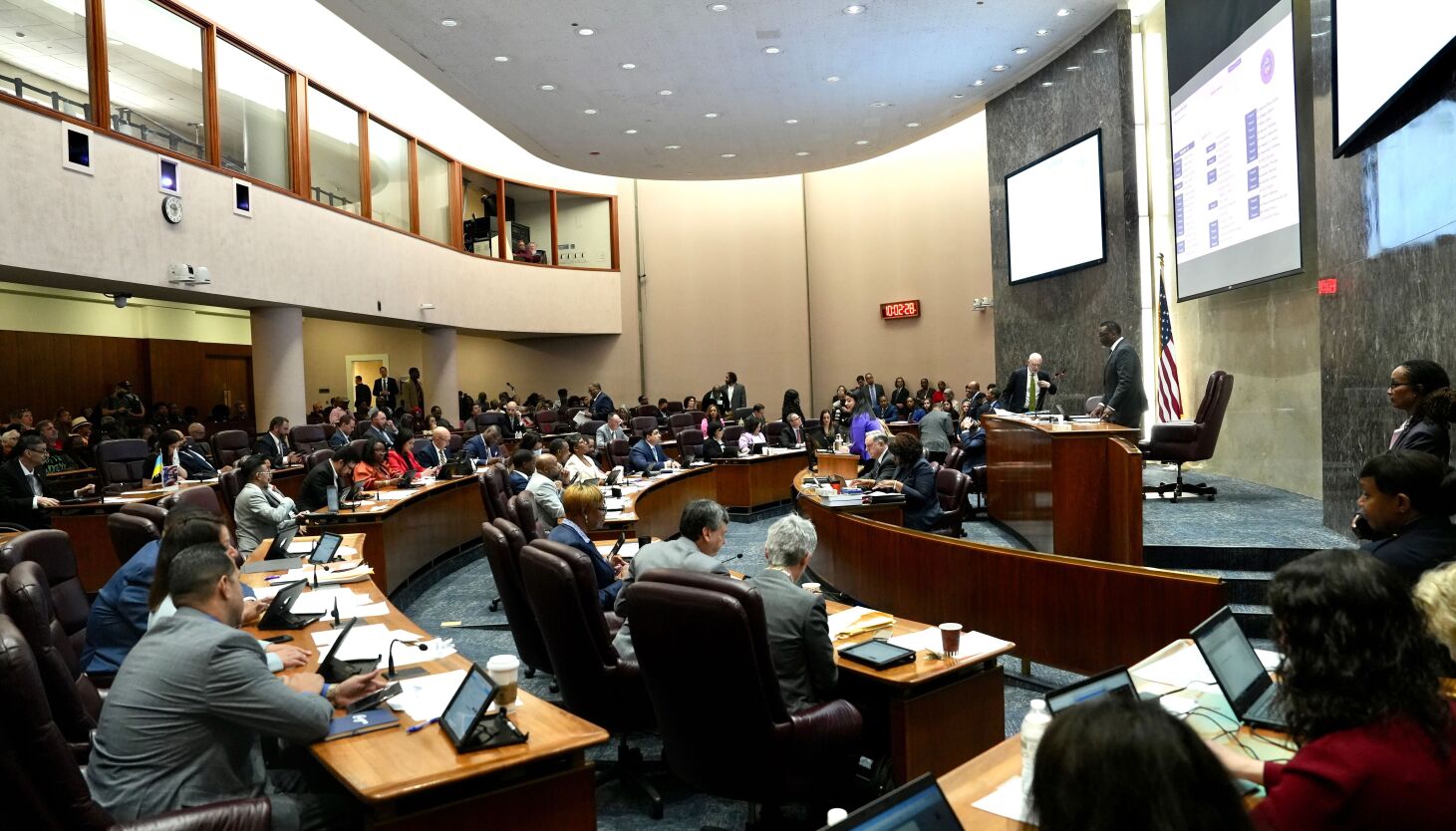



Mayor Brandon Johnson on Wednesday reshaped the City Council in his progressive image — and aced the first test of his legislative muscle.
Presiding over his first City Council meeting, Johnson easily won passage of the compromise he forged shrinking the number of committees from 28 to 20 and replacing Finance Committee Chairman Scott Waguespack (32nd) with Ald. Pat Dowell (3rd), whose decision to abandon Mayor Lori Lightfoot and endorse Johnson was a turning point in Johnson’s winning campaign.
The vote was 41 to 9.
Prior to the final vote, Alderpersons Ray Lopez (15th), David Moore (17th) and Jim Gardiner (45th) rose to voice their opposition to the new line-up. Their complaints were the same. A mayor who campaigned on a promise to usher in a new era of collaboration and inclusion chose his leadership team behind closed doors.
Some alderpersons were included. Others were not.
“You can’t cut deals with certain people to get them to say `yes’ “ when 17th Ward residents are “disrespected,” Moore said.
“This is not my seat. This is their seat. Every time, they have to have a voice in it....It’s not about the chairmanship. It’s about the process.”
After the vote, Ald. Anthony Beale (9th) rose to announce his resignation from the Zoning Committee in apparent protest over Ramirez-Rosa’s ascension to the job of Zoning chair.
The new line-up anoints Ramirez-Rosa, chair of the Council’s Democratic Socialists Caucus, as Zoning Committee chair. Ald. Jason Ervin (28th) is the new Budget Committee chair, replacing Dowell. All five members of the old Democratic Socialists Caucus were rewarded with committee chairmanships in the new line-up.
In addition to Ramirez-Rosa, who will double as Johnson’s floor leader, the line-up includes: Housing Chair Byron Sigcho-Lopez (25th); Education Chair Jeanette Taylor (20th); Pedestrian and Traffic Safety Chair Daniel LaSpata (1st) and Health Committee Chair Rossana Rodriguez-Sanchez (33rd).
Ald. Walter Burnett (27th), the 28-year veteran who replaces indicted and retiring Ald. Edward Burke (14th) as City Council dean, was stripped of his chairmanship and relegated to the largely ceremonial role of vice-mayor. Burnett stuck with Mayor Lori Lightfoot in Round One of the mayoral sweepstakes, then switched to Paul Vallas in the April 4 run-off.
Other senior alderpersons—including Waguespack, Anthony Beale (9th), Marty Quinn (13th), Brendan Reilly (42nd)—were left out in the cold. All but Waguespack supported Paul Vallas in both rounds of the mayor’s race.
It was the first test of Johnson’s City Council muscle—and his new floor leader’s ability to whip up votes.
Both Johnson and Ramirez-Rosa passed that first test with flying colors. Ramirez-Rosa predicted last week that the vote wouldn’t be close. And it wasn’t.
“We have gone through four years of gridlock in the Chicago City Council and it has not benefited anyone. We enter this term with major crises. The migrant crisis, violence, the ongoing need to create jobs. We have get things done…People want to see Mayor Brandon Johnson succeed,” Ramirez-Rosa told the Sun-Times last week.
“This unity plan is about avoiding gridlock. It’s about avoiding a divided government where nothing is getting done. Making sure that the diversity of our city is reflected at the table making decisions. And that that [the] table of decision-makers can then work quickly and expeditiously to improve every neighborhood.”
On March 30, the lame-duck City Council decided not to wait for the until the new mayor and Council are sworn in to declare its independence.
Led by three of Mayor Lori Lightfoot’s closest allies—Waguespack, Ervin and Rules Chair Michelle Harris (8th)—the Council approved a reorganization—with a new line-up of committees and chairs—that increased the number of committees from 19 to 28 to guarantee passage.
The multi-million-dollar expansion—without a clear-cut funding source—needed to be ratified by the new Council.
That created an opportunity for Johnson to weigh in—and he took it.
Ramirez-Rosa said the goal was not to punish Johnson’s political adversaries or show who’s boss. The objective, he said, was to make certain that the new mayor’s legislative agenda is not sabotaged or slow-walked.
During an interview with the Sun-Times last month, Waguespack warned Johnson to “leave this alone” and make no changes to the City Council reorganization approved on March 30, before the new mayor and Council can even be sworn in.
Asked whether those remarks sealed Waguespack fate, Ramirez-Rosa said, “There are those who wanted to work collaboratively and there were those that wanted to ice out the mayor…Ultimately, the vast majority decided that the best way to move forward is to work collaboratively with the mayor. That is so desperately needed right now.”
Dowell has had her eye on the Finance Chair from the get-go and Johnson has decided to reward her. She will become the first woman ever to serve as Finance Committee chair and, perhaps, reclaim some of the powers stripped away from the committee under Waguespack.
Instead of increasing the number of City Council committees from 19 to 28, what Johnson is calling the “Unity Plan” retains the original 19 and creates just one additional committee: “Police and Fire.” That’s in addition to the existing Committee on Public Safety.
Police and Fire will handle all issues relating to those two departments. The Committee on Public Safety will help deliver Chicago from violent crime in a more holistic way, as Johnson promised during his mayoral campaign.
In addition to the 20 City Council committees, there will be two permanent sub-committees: one on revenue, the other on youth employment.
The Revenue Sub-Committee of the Finance Committee will help build support for the $800 million in new or increased taxes needed to bankroll an array of jobs, education, mental health and social programs that form the cornerstone of Johnson’s anti-violence strategy or alternatives to those revenue ideas that business leaders are dead-set against.
Former Inspector General Joe Ferguson has predicted that Johnson’s decision to reward Ramirez-Rosa with the Zoning chair would “be a cause for real concern on the part of the business and development community.”
“It is the clear announcement of a new day. And that new day does not—at least not on the surface—appear to include a business and development community. Coming out of a very, very closely divided and contested race, it is a stark message to proceed with when you don’t have a major electoral mandate,” Ferguson has told the Sun-Times.
Although he has pushed for City Council independence, Ferguson had condemned the plan as “self-preservational” and a preemptive power move of the status quo wrapped in a package that includes meaningful reforms.” He had argued that there was no way to justify the 19 existing City Council committees, let alone 28.
But, Ferguson has still found it disheartening that Johnson would choose to dictate the line-up of committee chairs instead of allowing the Council to reorganize itself and choose its own leaders. To Ferguson, it’s more like, “Meet the new boss. Same as the old boss.”
“This is anything but independence. It’s just new wine in an old bottle. From the broader perspective of a need for checks and balance between the executive and the legislature, it is still the old Chicago. That’s not a good thing,” Ferguson said.
“By and large, everyone went along with the mayor after an initial period of dust-up and argument. What we need is something that truly constitutes checks-and-balances. Truly constitutes multiple visions and voices from the legislative and executive branch to push us towards the best outcomes. This looks more like the old way of doing things with new people. It’s a new form of machine.”
Ferguson has argued that Johnson’s decision to leave so much seniority and “so many key players” on the sidelines of his reorganization plan is a “matter of real concern.”
“It almost begs for something like the creation of a `Common Sense Caucus’ that stands in the middle and maybe holds, really, the balance of power with respect to which way major legislative initiatives go,” the former inspector general said.
“We’ll see, as we move into the budget cycle, where a lot of hard decisions are gonna have to be made. Where we’re gonna have to deal with revenue shortfalls. Where we’re gonna have to make some hard decisions about the Police Department and alternative forms of response.”
Mayoral allies have made the opposite argument.
They have predicted that Wednesday’s lopsided vote will set the stage for a collaborative relationship between Johnson and a City Council that had a contentious relationship with Lightfoot.
